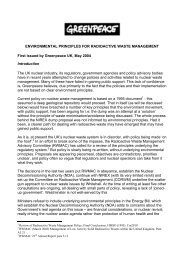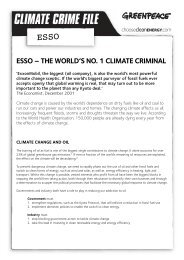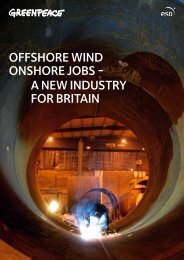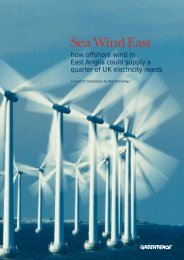Connecting the Future - Greenpeace UK
Connecting the Future - Greenpeace UK
Connecting the Future - Greenpeace UK
Create successful ePaper yourself
Turn your PDF publications into a flip-book with our unique Google optimized e-Paper software.
<strong>Connecting</strong> <strong>the</strong> future: <strong>the</strong> <strong>UK</strong>’s renewable energy strategy<br />
Foreword<br />
<br />
Foreword<br />
Back in <strong>the</strong> summer of 2005 – just before <strong>the</strong> G8 summit at Gleneagles on<br />
climate change – Prime Minister Tony Blair brought toge<strong>the</strong>r <strong>the</strong> world’s<br />
climate scientists in Exeter, to assess <strong>the</strong> latest climate science. Its conclusion?<br />
In order to avoid <strong>the</strong> worst effects of climate change, we need to stabilise<br />
global emissions within 10 years. At <strong>the</strong> end of 2007, <strong>the</strong> Intergovernmental<br />
Panel on Climate Change produced its latest assessment of <strong>the</strong> state of <strong>the</strong><br />
world’s climate, broadly confirming <strong>the</strong> findings of <strong>the</strong> Exeter Conference.<br />
At <strong>the</strong> beginning of August this year <strong>the</strong> clock really started ticking. We now<br />
have just 99 months to prevent <strong>the</strong> tipping point of catastrophic climate<br />
change. If global emissions have not been stabilised and begun declining by<br />
<strong>the</strong> end of 2015, <strong>the</strong>n our chances of keeping global temperature rise below<br />
two degrees – and <strong>the</strong>refore giving ourselves a good chance of avoiding<br />
catastrophic climate change – will be extremely remote.<br />
The need for a bold response from a nation that considers itself a world leader<br />
in tackling climate change has never been clearer, yet on too many fronts,<br />
<strong>the</strong> <strong>UK</strong> government seems intent upon repeating <strong>the</strong> mistakes of <strong>the</strong> past.<br />
From runways to new coal fired power stations, <strong>the</strong> government’s plans for<br />
resurrecting <strong>the</strong> icons that are <strong>the</strong> principle cause of climate change continue,<br />
despite <strong>the</strong> breadth of opposition marshalled against <strong>the</strong>m.<br />
Within this context, <strong>the</strong> government’s consultation on a new renewable<br />
energy strategy for <strong>the</strong> <strong>UK</strong> stands as a promising beacon of light. After years<br />
of timidity and failure, this consultation shows some small but encouraging<br />
signs that <strong>the</strong> government might just be starting to recognise <strong>the</strong> scale of<br />
potential for renewable energy in <strong>the</strong> <strong>UK</strong>. The consultation proves that <strong>the</strong><br />
ambitious target of generating 15% of <strong>the</strong> <strong>UK</strong>’s energy from renewable sources<br />
by 2020 (including electricity, heat and transport) is deliverable. It also shows<br />
though that in order to secure <strong>the</strong> enormous benefits this strategy could bring<br />
to <strong>the</strong> <strong>UK</strong>’s energy security, economy and <strong>the</strong> world’s climate, <strong>the</strong> government<br />
must put its money where its mouth is.<br />
As a contribution to <strong>the</strong> government’s consultation process, <strong>Connecting</strong> <strong>the</strong><br />
future systematically catalogues <strong>the</strong> history of initiatives, obligations and<br />
mechanisms introduced by <strong>the</strong> Labour government over <strong>the</strong> last decade to<br />
encourage renewable energy in <strong>the</strong> <strong>UK</strong>, providing a comprehensive critique of<br />
Labour’s approach. It sets out clear recommendations for how <strong>the</strong> government<br />
can redress <strong>the</strong> missed opportunities over <strong>the</strong> last 10 years, and at last turn<br />
<strong>the</strong> <strong>UK</strong> into <strong>the</strong> renewable energy powerhouse it is so well placed to become,<br />
leading <strong>the</strong> world in showcasing <strong>the</strong> real solutions to <strong>the</strong> challenges of climate<br />
change and energy security.<br />
On efficiency, <strong>the</strong> report advocates a more aggressive demand reduction<br />
strategy as a tough approach to energy efficiency. But a more proactive<br />
approach is required than yet more voluntary schemes for which no one


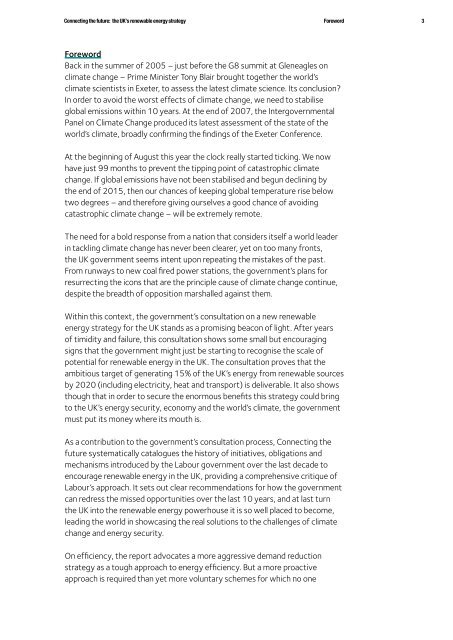

![[2007] EWHC 311 - Greenpeace UK](https://img.yumpu.com/22079793/1/184x260/2007-ewhc-311-greenpeace-uk.jpg?quality=85)

